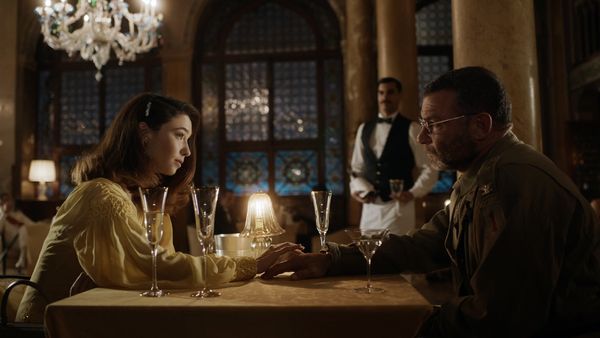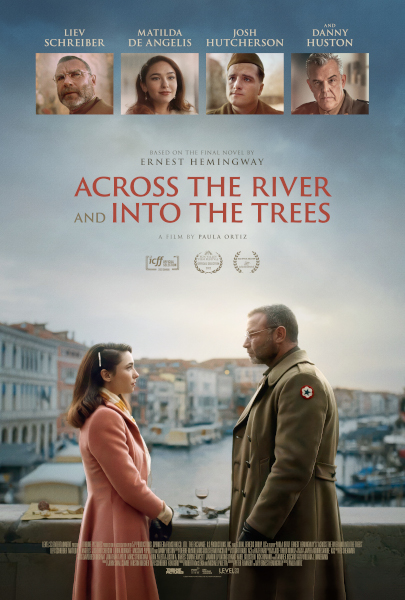Eye For Film >> Movies >> Across The River And Into The Trees (2022) Film Review
Across The River And Into The Trees
Reviewed by: Jennie Kermode

Ernest Hemingway’s last book was not well received when it first came out. Few critics called it terrible, but it wasn’t what most had expected of him – and one might be reminded of what initially happened to Beethoven’s Große Fugue, because herein lies the artist’s dilemma. To be successful, one should find a niche and stick with it. To produce work of real, lasting value, one must experiment and push boundaries. There’s a reason why the greatest talents – or the boldest – are never fully appreciated until after they’re dead.
Across The River And Into The Trees has grown in stature over time, so that this feels like the right time for it to make its way to the screen, with subtle adjustments by screenwriter Peter Flannery to ensure that those aspects very much of their time don’t distract from the overall effect. Capable of creating the necessary sense of languor without any diminution of insight, Paula Ortiz is very much the right director. As for Venice, it never fails to deliver, and the cinematic status it has developed in the meantime, as a destination for dreaming, dying men, gives it still more power.

Hemingway, of course, was familiar with Thomas Mann’s Death In Venice, though its sublime screen adaptation was still three decades away. Across The River And Into The Trees was inspired as much by his own relationship with much younger aristocrat Adriana Ivancich. For the uninitiated, the book and film revolve around the character of Cantwell (played by Liev Schreiber), a 51-year-old war hero with a less than enthusiastic attitude to war; a powerful, once very physical man who is struggling to adjust to life with heart disease; but a man more ready to embrace his mortality than those around him understand.
Travelling to Venice under the observation of devoted but naïf young soldier Jackson (Josh Hutcherson), he purports to be planning one last duck hunt, but in reality he has a different and far more personal priority. In the city, he encounters teenage countess Renata (Matilda De Angelis), teetering on the brink of an arranged (but loving) marriage, and her frantic effort to grasp hold of some more substantive direction inspires him to find joy in life one last time.
The moist air of the floating city is a cinematographer’s dream, and Javier Aguirresarobe’s cool yet sensual work is perfectly complemented by constumer Salvatore Farino’s use of light cotton, fur and silk. Though Cantwell speaks good Italian and knows the place well, his stiff khakis signal his distance; together with his age, they mark him out as a former Allied fighter, a man who is loathed by interfering in the country’s destiny, yet seen as a protector by others. This patriarchal role is complicated by his sense of having failed as a father, and although Renata might seem like a romantic interest, she also provides him with a chance of redemption, a chance to do the right thing as an adult to a child – if only he can overcome his disbelief that she would see something in him worth caring for at all.
Sharing Cantwell’s love of Venice, and having recently faced issues around mortality in his own life – not least because the film was shot during the first year of Covid – Liev Schreiber is a natural fit for the part. In accordance with some of Flannery’s changes and with the author’s acknowledged intentions, he brings a lot of Hemingway himself into the character, but benefits from longstanding familiarity with the material and is alert to the sensitivity, with inner pain and the humour of this superficially brusque man. There’s an avuncular twinkle in his eye when he’s torturing Jackson, who repeatedly finds himself caught between two sets of orders; but it’s the small ways in which he evidences uncertainty, even fragility, that bring Cantwell to life.
There’s a specificity about the relationship between Cantwell and the Countess that makes it convince. Restrained and shaped by formality even as Renata tries to flout convention, it doesn’t rely on sexual desire or fantasy, but functions as a meeting of minds – two people who might have influenced one another a great deal if they had more time, but whose brief moments together restore a sense of possibility even in Cantwell’s decline, even to a viewer who is certain of how it will end. There’s a magic in the stillness of the Venetian night, in the shifting mists of morning. The magic in Hemingway’s creation is finally released.
Reviewed on: 02 Sep 2024















